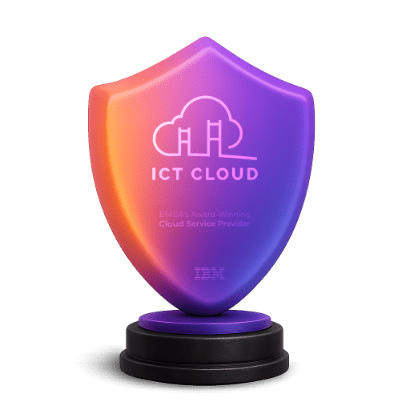OUR CORE SERVICES
We provide cutting-edge managed cloud services that ensure speed, scalability, and security for your business.
At ICT Cloud Computing Services, our OpenStack Infrastructure as a Service (IaaS) is designed for enterprises that need:
- Elastic scalability to adapt quickly to changing business demands
- ecurity & compliance with GDPR-ready infrastructure and encrypted environments
- Reliability & control through enterprise-grade SLAs and 24/7 managed support
- Strategic presence with data centers in Frankfurt, London, and across Europe
Our IaaS gives your business a resilient foundation for growth — freeing your teams to focus on innovation, operations, and customer success.
When your infrastructure is built to expand securely, international growth becomes a business decision — not a technical hurdle.
S/4HANA timelines don’t pause for platform delays. We provide a ready-to-run SAP landing zone in Germany or the UK—so your program can move on schedule.
- Brownfield, greenfield, or system copy paths with documented cutover
- Certified HANA builds with OS hardening and encryption at rest/in transit
- Transparent SLAs, cost baselines, and scaling guardrails
- 24/7 SAP Basis and infrastructure operations
Your teams stay focused on process change and data quality—we keep the stack compliant, performant, and recoverable.
AI as a Service (AIaaS) — Making AI accessible, scalable, and sovereign.
With AIaaS, every company can now unlock the power of AI without investing in complex infrastructure.
At ICT Cloud Frankfurt, we deliver:
- GPU-powered model training & inference
- GDPR-compliant data sovereignty
- FinOps & AIOps-driven optimization
- Scalable AI use-cases for SAP, IoT, Manufacturing, and Energy
“From Infrastructure to Intelligence.”
Accelerate your business with ICT Cloud AIaaS.
ICT Cloud offers comprehensive Managed Services that empower organizations to harness the full potential of cloud technology without the hassle of management complexities.
- Why Choose ICT Cloud Managed Services?
Robust Infrastructure: Benefit from 24/7 management and a resilient network infrastructure that aligns with your core business objectives.
Integrated Services: Seamlessly connect your chosen cloud resources with existing systems for uninterrupted access.
Scalability & Flexibility: Gain full control over your cloud environments, allowing you to focus on what matters most—your business.
Multi-Technology Expertise: From infrastructure to applications, our services cover all aspects of cloud management.

ICT Cloud delivers secure, high-performance solutions designed around your business needs.
From Europe to global markets, we help businesses accelerate growth through reliable cloud infrastructure and expert support.
DISCOVER OUR SOLUTIONSYour data is protected by enterprise-grade security measures across all layers — from network and infrastructure to application and access control. ICT Cloud follows strict security frameworks and operates within ISO 27001-certified data centers in Europe and UK to ensure full data integrity and protection against cyber threats.
Data sovereignty is at the heart of our operations. With ICT Cloud’s infrastructure hosted in Germany, United Kingdom and across Europe, your data always remains within regulated European borders — fully compliant with local data protection and GDPR requirements.
Whether you’re a fast-growing startup or a global enterprise, ICT Cloud scales with you. Our flexible architecture lets you easily expand your cloud resources on demand, ensuring high performance, reliability, and cost efficiency — without compromising control.
ICT Cloud operates within a fully regulated environment that adheres to European and international compliance standards. Our infrastructure is built to meet strict legal, operational, and data protection requirements — ensuring transparency, accountability, and full alignment with regulatory frameworks such as GDPR.
Find solutions for putting your ideas into action
Scale flexible, high-performance, and secure infrastructure resources (vCPU, RAM, GPU, Bare Metal) to meet your needs.
Reliable and scalable storage solutions (NVMe, Ceph, S3 compatible) for fast, secure, and flexible data management.
Secure and optimize your infrastructure with advanced networking solutions — virtual networks, load balancing, firewalls, and VPN services.
Ensure business continuity with automated backup, VM replication, snapshots, and cross-region disaster recovery solutions.
Stay in control with 24/7 managed monitoring, real-time metrics, and intelligent alerts for your infrastructure.
Simplify container orchestration with managed Kubernetes solutions and full support for Magnum or Rancher environments.

MEET OUR POWERFUL GLOBAL NETWORK
Your networks are at the core of delivering end-user experiences, supporting business initiatives. But often, the performance of your network traffic can be unpredictable due to intermediate networks outside of your control.
Total SLA
Total Customers
Services Abroad
Total Data Volume (PB)

Secure, scalable, Sovereign and customer-focused Managed cloud excellence
We empower your business with reliable cloud solutions designed to scale with you.
CONTACT SALES
